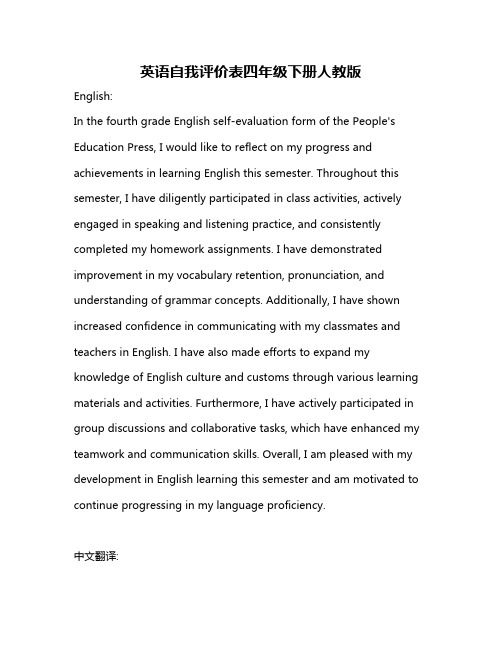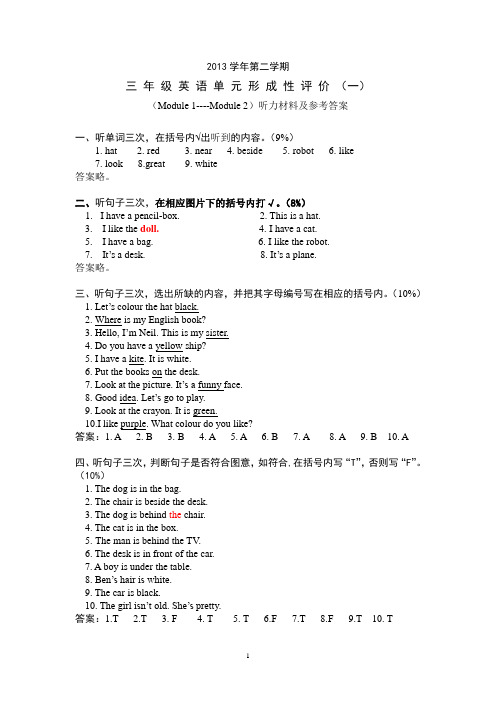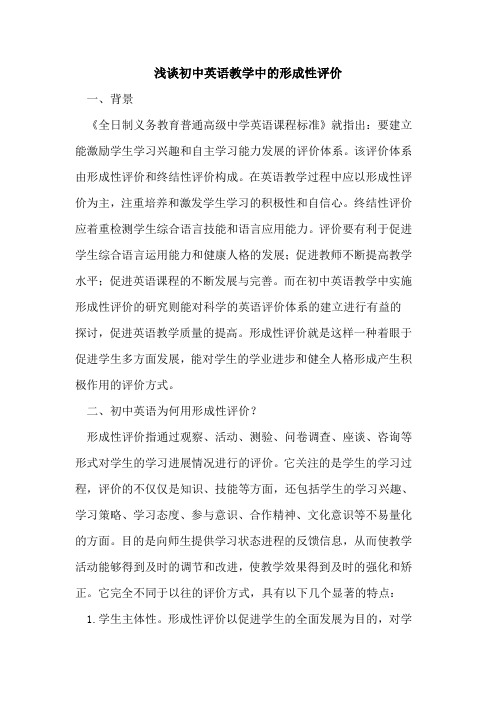英语形成性评价表
2005学年度第一学期六年级英语形成性评价题(一)听力材料

2005学年度第一学期六年级英语形成性评价题(一)听力材料一、听句子三次,选出句子所提及的信息,并把其字母编号写在相应的括号内。
(10分)1. Shall we go on the Pearl River Cruise Next week?2. We’re going to the Six Banyan Temple tomorrow.3. I’m going to visit Shanghai this summer holiday. And I’m going to stay there for amonth.4. When are you going to start to Zhuhai?5. My family are watching a stupid film when the football game is on.6. We’re going to leave our house at half past eight.7. Do you want to play table tennis with me tonight?8. They’re going to take photos there.9. Great! I like Guangdong dimsum very much.10. What are you going to do on Thursday evening? I’m going to watch a footballmatch on TV.二、听句子三次,写出句子所缺的单词。
(5分)1. We have been to the zoos many times.2. All of us are going to have fun in the party.3. Shall we go and watch the birds in the park?4. The women are going to buy some clothes.5. Why don’t you come and start with us?三、听对话及问题三次,选择问题的正确答案,并把其字母编号写在相应的括号内。
英语自我评价表四年级下册人教版

英语自我评价表四年级下册人教版English:In the fourth grade English self-evaluation form of the People's Education Press, I would like to reflect on my progress and achievements in learning English this semester. Throughout this semester, I have diligently participated in class activities, actively engaged in speaking and listening practice, and consistently completed my homework assignments. I have demonstrated improvement in my vocabulary retention, pronunciation, and understanding of grammar concepts. Additionally, I have shown increased confidence in communicating with my classmates and teachers in English. I have also made efforts to expand my knowledge of English culture and customs through various learning materials and activities. Furthermore, I have actively participated in group discussions and collaborative tasks, which have enhanced my teamwork and communication skills. Overall, I am pleased with my development in English learning this semester and am motivated to continue progressing in my language proficiency.中文翻译:在人民教育出版社的四年级英语自我评价表中,我想反思一下这个学期学习英语的进步和成就。
2013学年度第二学期三年级英语单元形成性评价听力(1—4)全

2013学年第二学期三年级英语单元形成性评价(一)(Module 1----Module 2)听力材料及参考答案一、听单词三次,在括号内√出听到的内容。
(9%)1. hat2. red3. near4. beside5. robot6. like7. look 8.great 9. white答案略。
二、听句子三次,在相应图片下的括号内打√。
(8%)1.I have a pencil-box.2. This is a hat.3. I like the doll.4. I have a cat.5. I have a bag.6. I like the robot.7. It’s a desk. 8. It’s a plane.答案略。
三、听句子三次,选出所缺的内容,并把其字母编号写在相应的括号内。
(10%)1. Let’s colour the hat black.2. Where is my English book?3. Hello, I’m Neil. This is my sister.4. Do you have a yellow ship?5. I have a kite. It is white.6. Put the books on the desk.7. Look at the picture. It’s a funny face.8. Good idea. Let’s go to play.9. Look at the crayon. It is green.10.I like purple. What colour do you like?答案:1. A 2. B 3. B 4. A 5. A 6. B 7. A 8. A 9. B 10. A四、听句子三次,判断句子是否符合图意,如符合,在括号内写“T”,否则写“F”。
(10%)1. The dog is in the bag.2. The chair is beside the desk.3. The dog is behind the chair.4. The cat is in the box.5.The man is behind the TV.6. The desk is in front of the car.7. A boy is under the table.8. Ben’s hair is white.9. The car is black.10. The girl isn’t old. She’s pretty.答案:1.T 2.T 3. F 4. T 5. T 6.F 7.T 8.F 9.T 10. T五、听问句三次,选出相应的答句,把其字母编号写在括号内。
英语教学形成性评价

英语教学形成性评价《新课程标准》指出:“中学英语教学的目的,是对中学生进行听、说、读、写的基本训练,培养学生口头上的书面上初步运用英语的能力,侧重培养阅读能力。
”从某种意义上说,阅读能力的提高,是听、说、写能力提高的关键。
通过阅读,扩大了知识面,增加了词汇量。
为了培养学生的阅读习惯,根据学生的实际情况,因人而异地给予阅读指点,堤出不同要求,帮助学生树立信心,逐步形成良好的习惯。
一、养成一个良好的阅读习惯阅读的重要性。
阅读可以训练思维能力、理解能力、概括能力与判断能力。
英语教学大纲反复强调“中学阶段侧重培养学生的阅读能力”,这是非常重要的。
阅读理解能力必须经过教师长期、有计划地培养才能提高,这里便涉及到一些方法问题。
学有法,就能取得事半功倍的效果;否则,事倍功半。
阅读的方法。
阅读能力的培养和提高不是一朝一夕能够达到的。
需要经过长期的努力,一步步提高。
在这个过程中,课内精读和课外泛读都很重要。
只强调精读课本,不进行课外泛读,就无法扩大知识面,无法提高阅读速度,就只能是逐词逐句爬行式的阅读;而不重视精读课本,一味强调课外泛读,势必造成基础不实,对所读材料理解不透的后果。
因此,必须在精读课文的基础上,进行一定量的课外泛读。
1.培养学生正确的阅读习惯。
许多中学生不明确学英语的宗旨和目的,好像学习是为了应付考试,甚至把课外阅读看成是浪费时间,得不偿失,不愿花时间。
有的学生在阅读的时候,喜欢用手和笔指着读,有的则咬文嚼字,边读边对一词一句进行分析,等别人早已读完,他还不知文章所云。
总之要培养一个好的阅读习惯,这样久而久之,便可积少成多。
不但能增加所学词汇的复现率,而且增加学生的知识面,培养用英语直接思维的能力。
教师从课文教学抓起。
课文是培养学生阅读能力的主要材料。
课文教学的成败,直接影响学生阅读能力的培养和提高。
课前预习。
课前预习是培养学生自学能力的重要手段之一。
通过预习,学生综合运用已有知识和技能,初步了解教材内容,发现教材的疑难问题,带着问题上课。
新教材高中英语单元形成性评价(一)WeleUnit(含解析)新人教版

单元形成性评价(一)Wele Unit(120分钟150分)第一部分听力(共两节, 满分30分)第一节(共5小题; 每小题1. 5分, 满分7. 5分)听下面5段对话。
每段对话后有一个小题, 从题中所给的A、B、C三个选项中选出最佳选项。
听完每段对话后, 你都有10秒钟的时间来回答有关小题和阅读下一小题。
每段对话仅读一遍。
Text 1M: I want a pet. Should I get a dog or a cat?W: ①How about a fish? A dog or a cat is too much work. A fish is easy to take care of, and you can leave it alone for most of the day.1. What kind of pet does the woman suggest?A. A dog.B. A fish.C. A cat.答案: BText 2W: Excuse me. ②Could you tell me the way to the railway station, please?M: Sorry. I’m a stranger here, too. But why don’t you ask that man who is sitting in front of the grocery store? You see the store I’m talking about? The one next to the movie theater.2. Which place is the woman looking for?A. A grocery store.B. A movie theater.C. The railway station.答案: CText 3M: Linda, ③do you have everything ready for college? Did you pay housing fees, sign up for the meal plan and meet with your academic teachers?W: Yeah, I did that a few days ago.3. What are the speakers mainly talking about?A. Preparations for college.B. Housing fees.C. Meal plans.答案: AText 4M: Hi, Joanne. It is not easy for a newer like me to find a book here.W: Don’t worry. ④At the beginning of every term, introductory tours will be given by the librarian.M: Oh, really? They are considerate.4. Where does this conversation probably take place?A. In a classroom.B. In a library.C. In a bookstore.答案: BText 5W: Oh, hi. What is your name again? ⑤I c an’t keep straight all the students’ names in our Medical School.M: It’s okay, Miss Smith. I have a hard time remembering names.5. What’s the probable relationship between the speakers?A. Teacher and student.B. Doctor and patient.C. Mother and son.答案: A第二节(共15小题; 每小题1. 5分, 满分22. 5分)听下面5段对话或独白。
初中英语教学中的形成性评价

浅谈初中英语教学中的形成性评价一、背景《全日制义务教育普通高级中学英语课程标准》就指出:要建立能激励学生学习兴趣和自主学习能力发展的评价体系。
该评价体系由形成性评价和终结性评价构成。
在英语教学过程中应以形成性评价为主,注重培养和激发学生学习的积极性和自信心。
终结性评价应着重检测学生综合语言技能和语言应用能力。
评价要有利于促进学生综合语言运用能力和健康人格的发展;促进教师不断提高教学水平;促进英语课程的不断发展与完善。
而在初中英语教学中实施形成性评价的研究则能对科学的英语评价体系的建立进行有益的探讨,促进英语教学质量的提高。
形成性评价就是这样一种着眼于促进学生多方面发展,能对学生的学业进步和健全人格形成产生积极作用的评价方式。
二、初中英语为何用形成性评价?形成性评价指通过观察、活动、测验、问卷调查、座谈、咨询等形式对学生的学习进展情况进行的评价。
它关注的是学生的学习过程,评价的不仅仅是知识、技能等方面,还包括学生的学习兴趣、学习策略、学习态度、参与意识、合作精神、文化意识等不易量化的方面。
目的是向师生提供学习状态进程的反馈信息,从而使教学活动能够得到及时的调节和改进,使教学效果得到及时的强化和矫正。
它完全不同于以往的评价方式,具有以下几个显著的特点:1.学生主体性。
形成性评价以促进学生的全面发展为目的,对学生的知识、智力、能力、情感因素等各方面进行考虑,并力求通过评价促使学生学会自我评价和相互评价,帮助学生更清楚地认识自我,充分体现了以学生为主体的特点,完全符合素质教育“以人为本”的教育宗旨。
2.注重过程性。
形成性评价是一种关注学生学习过程的持续性评价,它始终贯穿于学生学习的全过程,必须在师生共同的努力下,对教学活动进行监控、反思,使教学活动更有针对性,并始终能朝着健康的方向发展。
3.开放发展性。
形成性评价促进学生自我发展的特点决定了其评价方式和手段的多样性和开放性。
教师采用的是宽松、开放式的描述性评价,评价结果能较准确地反映出学生的各方面情况。
广州版三年级英语下的单元形成性评价 (四)

2010学年第二学期三年级英语单元形成性评价 (四)(Module 1 - Module 6)Class______No.__________Name___________Assessment________一、听单词或短语三次,将其英文大写字母编号写在相应图下的括号里。
( )( ) ( )( )( )( )( )( )( )( )二、听句子三次,选出你所听到的信息,把其字母编号写在括号内。
( ) 1. A. chalk B. board rubber C. box( ) 2. A. living room B. bedroom C. classroom( ) 3. A. on the shelf B. on the floor C. on the ceiling ( ) 4. A. seven toilets B. seven buildings C. seven flowerbeds ( ) 5. A. the UK B. the USA C. Japan( ) 6. A. a goat and a rabbit B. a turtle and a rabbit C. a dog and a rabbit ( ) 7. A. teachers’ room B. headmaster’s office C. playground( ) 8. A. short tails B. long tails C. long legs( ) 9. A. Sally’s aunt is short. B. Sally’s aunt is slim. C. Sally’s aunt is old.( ) 10. A. The building is astudy. B. The building is a canteen. C. The building is alibrary.三、听句子三次,判断所读的内容是否符合图意,如符合在括号内写“T”,否则写“F”。
2017学年度第一学期三年级英语单元形成性评价听力材料

2017学年度第一学期三年级英语单元形成性评价听力材料及评分标准单元形成性评价(一)(Module 1-Module 2)一、听字母、字母组或单词三次,在所读内容的括号内打“√”。
1.E2.f3.M4.IQ5. kg6.CEO7.nice8. mum9.grandpa二、听单词三次,根据发音规则,判断下列单词是否正确,如正确,在括号内写“T”,否则写“F”。
4%1.pig2.cake3.pan4.bug5.kid6.pot7.get8.cut三、听句子三次,在相应人物的括号内写出其字母编号。
A. Hi, I’m J iamin.B. My name is Xiaoling.C. Hello. I’m Ben.D. Hello. I’m Aki.E. This is Mr. Chen.F. Hi, I’m Ms White.G. This is Mike. H. My name is Janet.四、听句子三次,选出句子所缺的单词,把其字母编号写在相应的括号内。
1. Good afternoon.2. Let’s be good friends!3. What’s your name?4. My name is Mike.5. This is my dad.6. Hello! I’m Ben.7. How are you? 8. This is my teacher.五、听小对话三次,判断句子是否符合图意,如符合,在括号内写“T”,否则写“F”。
1. A(男): Good morning. B(女): Good morning.2. A(男): How are you? B(男): I’m fine.3. A(女): Good afternoon, Ben. B(男): Good afternoon, Mum.4. A(男): What’s your name? B(女): My name is May.5. A(男): Good evening, Janet. B(女): Good evening, Chen Bin.6. A(男): Nice to meet you, Ms White. B(女): Nice to meet you, too.7. A(女): This is my grandma.B(男): Nice to meet you, Grandma.8. A(男): Hi, I’m Li Mingming. What’s your name?B(女): Hi. My name is Wang Lingling.六、听句子三次,选出相应的答句,把其字母编号写在括号内。
- 1、下载文档前请自行甄别文档内容的完整性,平台不提供额外的编辑、内容补充、找答案等附加服务。
- 2、"仅部分预览"的文档,不可在线预览部分如存在完整性等问题,可反馈申请退款(可完整预览的文档不适用该条件!)。
- 3、如文档侵犯您的权益,请联系客服反馈,我们会尽快为您处理(人工客服工作时间:9:00-18:30)。
家长签字
组长签字
组长签字
组长签字
家长签字
家长签字
家长签字
组长签字
组长签字
组长签字
家长签字
家长签字家长签字组长源自字组长签字组长签字
签字(合格/不合格)
签字(合格/不合格)
签字(合格/不合格)
单元名称
听读跟读
重点单词句子听写
背诵文段
家长签字
家长签字
家长签字
组长签字
组长签字
组长签字
家长签字
家长签字
家长签字
组长签字
组长签字
组长签字
家长签字
家长签字
家长签字
组长签字
组长签字
组长签字
家长签字
家长签字
家长签字
组长签字
组长签字
组长签字
家长签字
